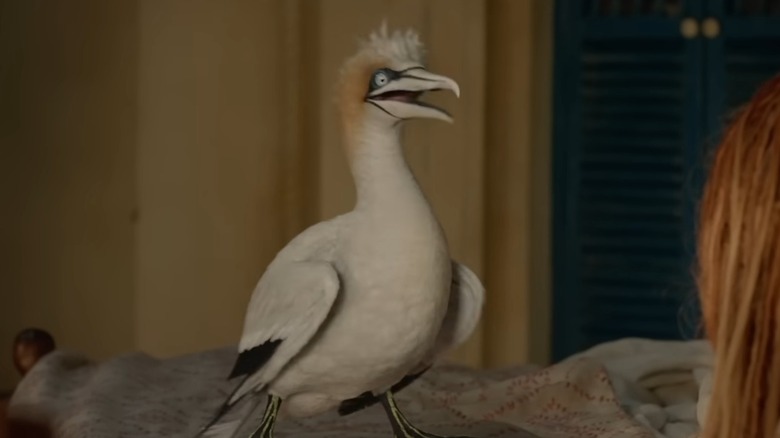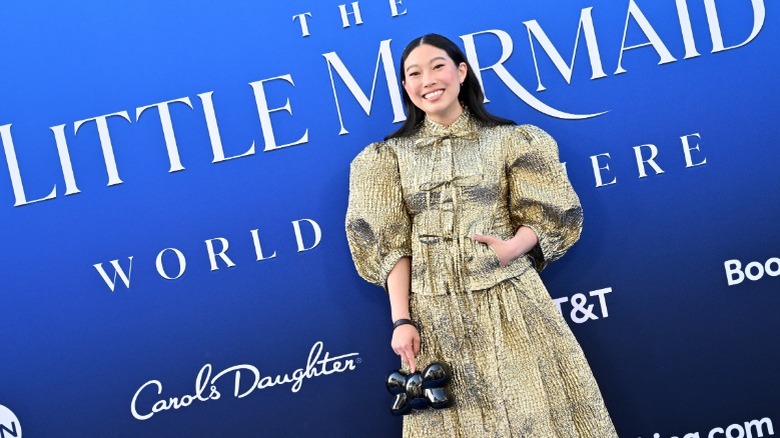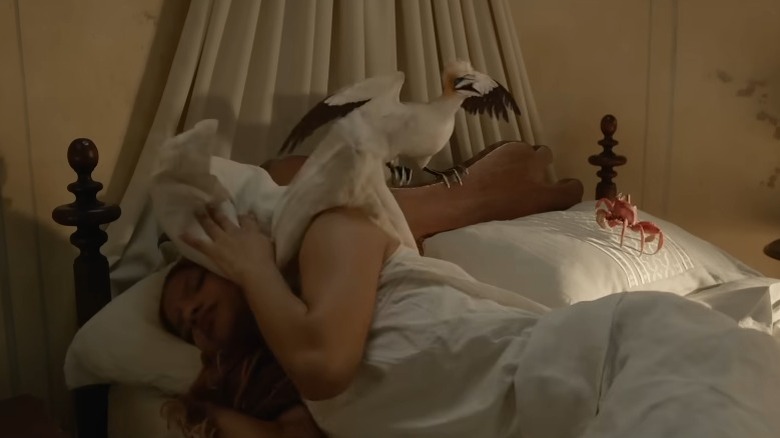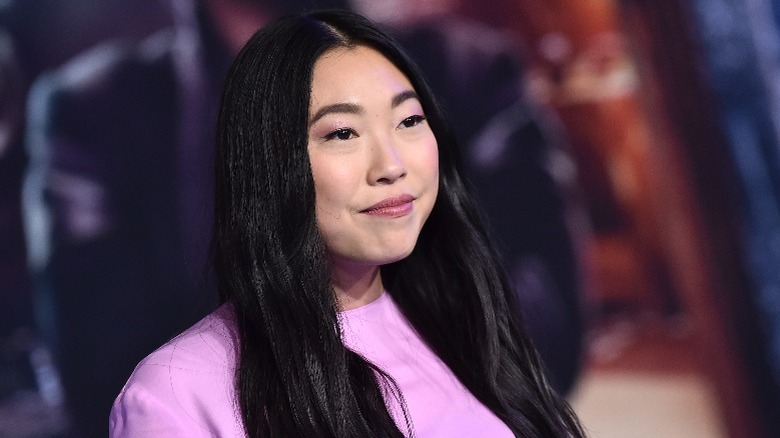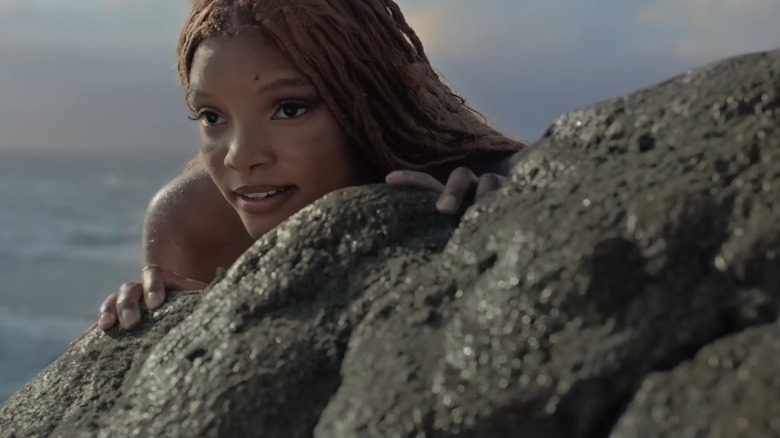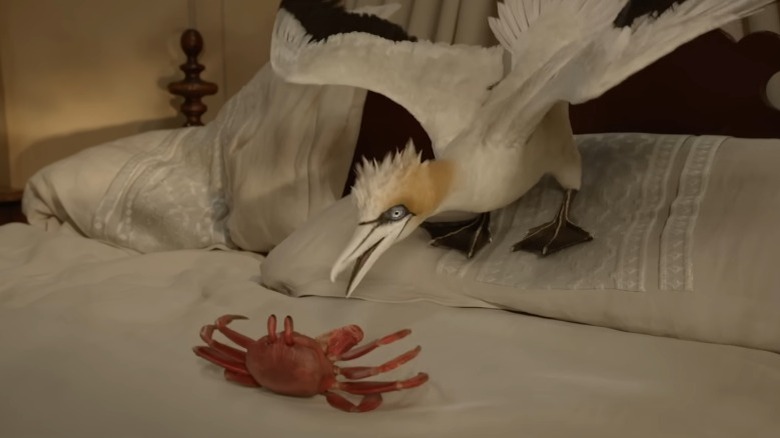Who Plays Scuttle In The New Little Mermaid & Why Did She Receive Such Hate?
The frenzy of Disney live-action remakes has been one of the central stories of the past decade in film, and one thing that's become clear so far through these refitted takes on beloved animated classics is the adoration audiences reserve specifically for the Disney Renaissance titles. The three most commercially successful remakes of the crop by far — 2017's "Beauty and the Beast," and 2019's "The Lion King" and "Aladdin" — were all stringently faithful reimaginings of definitional entries in the Mouse House's legendary 1989-1999 run, with a large part of their appeal stemming from their direct recreation of moments from the original films. Therefore, a similarly faithful remake of 1989's "The Little Mermaid," the movie that started the Disney Renaissance in the first place, was always going to be a major event. And indeed, it has turned out to be just that.
Starring the angelic-voiced Halle Bailey as Ariel in a miraculous feat of casting, Rob Marshall's "The Little Mermaid" overcame significant internet controversy and backlash over the course of its promotional cycle, and is now on track to become one of the biggest and most successful efforts of Disney's nostalgia-trip era; families around the world have fallen head-over-heels in love with the film's update of the original's life-affirming spirit to a more contemporary sensibility. But some elements of this new "Little Mermaid" have nonetheless proven divisive, and one of them is the performance of Nora Lum, a.k.a. Awkwafina, who voices the new version of Ariel's avian friend Scuttle.
Awkwafina is a multi-hyphenate entertainer on the rise
When "Ocean's Eight" came out in 2018 boasting as its primary publicity draw an unfathomably star-studded cast, Awkwafina — who at the time was primarily known as an actress for her supporting role in "Neighbors 2: Sorority Rising" — stood out as an up-and-comer in a sea of A-listers. But, looking back, the American actress, comedian, and rapper has proven to be every bit as much of a star as her castmates.
The one-two punch of "Ocean's Eight" and "Crazy Rich Asians" in 2018 helped Awkwafina attain breakout status, and she has pretty much not stopped working since, with supporting turns in "Jumanji: The Next Level," "Shang-Chi and the Legend of the Ten Rings," and "Renfield" all contributing to her newfound place as a household name in Hollywood. Her incredible, award-winning performance in Lulu Wang's acclaimed family drama "The Farewell" showed the world that Awkwafina was a force to be reckoned with as a dramatic actor, and her ongoing Comedy Central series "Awkwafina Is Nora from Queens" has put her in the pantheon of TV comedy stars who mined gold from autobiographical storytelling.
Additionally, Awkwafina has established herself as a prolific voice actress, stepping into the recording booth for films like "The Angry Birds Movie 2," "Raya and the Last Dragon," and "The Bad Guys." In fact, "The Little Mermaid" is not her first rodeo playing a bird — that would be 2016's "Storks," in which she had a brief role as a quail.
Her performance in The Little Mermaid has been considered grating by some fans
Why, then, if Awkwafina is such an established star and a voice actress with plenty of experience to her name, did her performance as Scuttle in "The Little Mermaid" stir so much controversy? The explanation is, in part, complicated; the appearance of this actress singing these songs in this movie specifically ended up being the unplanned culmination of various different backlashes, some of them more fair than others. But, first and foremost, even removed from context, the performance was divisive because a lot of viewers simply found it grating.
Awkwafina's characteristic vocal fry and rapid-fire, uber-excited line delivery, coupled with the film's depiction of Scuttle as a dim-witted, loudmouthed comic relief character with a somewhat overbearing presence by design, made the performance the kind of ubiquitous that doesn't sit well with everybody.
On Twitter, viewers of "The Little Mermaid" left comments like "Whhhyyy did they put Awkwafina in this movie bro," "I can't stand Awkwafina's voice and her version of Scuttle was beyond irritating to me," and "the [sic] should release a version of the little mermaid soundtrack without awkwafina ruining everything." Even some of the film's fans made a point of criticizing Awkwafina's performance. On Reddit, meanwhile, a discussion on r/popheads about the film and the performances in it included user u/illnessincarnate arguing, "Awkwafina's voice is very raspy and grating. It sounds like she's been smoking 10 packs a day for 70 years."
Awkwafina herself has faced criticism for appropriating Black culture
Aside from the fact itself of Awkwafina's performance as Scuttle, the actress and rapper has been facing criticism from early on in her career, due to the heavy accent she often displays in her music and comedic performances, and which many see as a forced "blaccent," i.e. a willful appropriation of African-American culture and vernacular. The fact that she voices Scuttle with her typical performance style, and even raps at one point in the film, appears to have brought that criticism to the fore in many viewers' minds.
Beginning with her songs and music videos, which often engaged in a pastiche-like run-through of hip-hop tropes, and on through her comedic acting following her 2018 breakthrough, Awkwafina has raised some viewers' eyebrows due to an impression that she's deliberately approximating the stereotypical aesthetics and iconography of Black Americans, particularly Black American women.
It's a controversy that has been re-ignited time and time again and analyzed extensively by outlets such as Insider and Vulture, with Awkwafina herself having responded to the criticism by explaining her childhood connection to hip-hop culture, and professing her commitment to understanding and respecting the history of African American Vernacular English (AAVE). Yet some feel like her role as Scuttle displays a lack of true understanding of the issue, with an article on Decider arguing that her rap number in the film "implies that she doesn't consider how cultural appropriation affects Black people, nor has she learned from her past controversies."
The film as a whole has been targeted by racist backlash
The controversy over Nora Lum's "blaccent" is an old one that will seemingly continue to renew itself for as long as she keeps on doing her "Awkwafina voice" in film projects. But, in the case of "The Little Mermaid," the negative response to her performance inevitably extended beyond reasonable critiques concerning cultural appropriation and vernacular organicity. After all, this is a movie that has been met with racist backlash from the moment its central casting choice was announced — and, while Awkwafina has not been the primary target of said backlash by any measure, she still caught some of its heat.
The same pearl-clutchers who have been unable to wrap their heads around a Black Ariel, mind you, have also had to contend with a Scuttle who is not only gender-bent, but also played by an actress of color. Making the character a gannet instead of a seagull probably didn't help matters, seeing as that kind of self-righteous racism often presents itself under the guise of anal-retentive purism.
At the same time, some critics have viewed Awkwafina's Scuttle, with her "blaccent" and rapping antics, as a potential contributing factor to the racist backlash against the film. As argued by Decider's Raven Brunner, "while catering to racist trolls should never be at the forefront when creating art, the tone-deafness around both the purpose of the song and who's performing it could help amplify that unfortunate side of the conversation."
Scuttle's Lin-Manuel Miranda-penned song has been met with particularly heavy criticism
The biggest focal point of the criticism against Awkwafina's performance in "The Little Mermaid" has undoubtedly been her song "The Scuttlebutt," a three-minute rap number performed by Awkwafina and Daveed Diggs (who voices Sebastian), and which gives center stage to the actress-slash-rapper's idiosyncratic flow. Consisting of a discussion between Scuttle and Sebastian about rumors that Prince Eric (Jonah Hauer-King) is going to get married, the song has been heavily criticized ever since the film's soundtrack was released.
As recapped by DisneyFanatic.com, YouTube commenters absolutely read the song for filth, criticizing its lyrics, its length, its dissonant vibe (it's the only new song in the film that doesn't conform to the original's more traditional balladry style), and Awkwafina's performance — especially when compared to Halle Bailey's crystalline, classic vocals elsewhere in the film.
Once again, this is a case of a long-brewing backlash reaching its peak. In this case, of course, the backlash in question would be the one against songwriter Lin-Manuel Miranda, whose pioneering style of energetic, perkily sincere, wordplay-laden rap showtunes, once a near-unanimity at the height of his Broadway success, has gone on to yield diminishing returns for some viewers and listeners. A Reddit thread on "The Scuttlebutt" featured such highly-upvoted comments as u/ApprehensiveToday692's "Lin Manuel Miranda must be stopped," and u/pabsgt's "Change.org don't let Lin Manuel Miranda make more songs for Disney" — with plenty of criticism for Awkwafina's rapping sprinkled throughout the thread as well.
